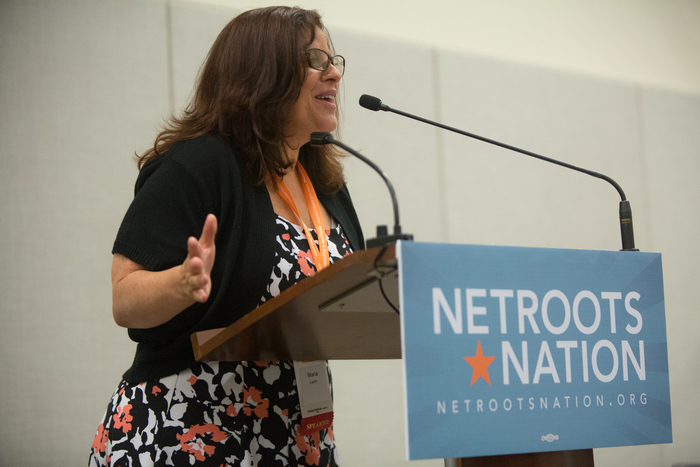 Marla Lipkin at Netroots Nation.
Marla Lipkin at Netroots Nation.
Thousands of social justice advocates, grassroots organizers, bloggers, and other activists gathered for three days recently in Phoenix, Ariz., for Netroots Nation, an annual conference widely considered to be the nation’s largest gathering of progressives.
In addition to discussing immigration policy, income inequality, same-sex marriage, gun violence, and racial relations, attendees learned from paraeducator Marla Lipkin about her local’s anti-privatization campaign that saved 300 education support professional (ESP) jobs.
As a panelist, Lipkin, president of the Pennsbury Educational Support Professionals Association (PESPA) in Pennsylvania, explained how her local of 650 members was able to get organized, mobilize community members, identify business allies, work with the media, and emerge victorious without losing a single job position.
“Having the opportunity to attend Netroots and speak to other activists assures me that we are not alone in this [anti-privatization] fight,” Lipkin told attendees. “But we must keep telling our stories to raise awareness.”
Privatization, also known as “outsourcing” and “contracting out,” means transferring the work of public school and other public sector employees to the private sector. For parents and the community, privatization is a threat to the health and safety of students. For ESPs, privatization is another word for “fired!”
“I see more and more locals across the country facing the threat of privatization,” Lipkin told the gathering. “Our former school board was led by someone who wanted to destroy our union. He ran on the platform of not raising taxes. In order to do that, savings had to be found.”
Firing school support staff was identified as a means to cut costs. Once the school district started to consider outsourcing ESP jobs, PESPA’s paraeducators, bus drivers, clerical staff, custodial workers, information technology staff, and maintenance workers immediately organized a ground game.
“We knew we needed our community’s support to combat this threat,” Lipkin said.
PESPA members turned to Facebook, Twitter, and other social media to get the word out. They also created a website with photos of members in action, job classification descriptions, information on why privatization doesn’t work, and school board member contact information. There was also a direct link to PESPA’s petition, which asked community members to object to privatization. A Web page was also created to thank business owners for displaying posters in shop windows and restaurants.
“We also encouraged our union members to support those businesses,” said Lipkin, acknowledging the importance of reciprocity and its value to community partners.
PESPA members left no stone unturned when it came to making their point. They debated board members over the radio, distributed yard signs, presented at PTA meetings, and produced a commercial with help from the Pennsylvania State Education Association (PSEA) that was broadcast at high school football games.
They also relied on everyday face-to-face contact, speaking to neighbors and anyone else who would listen. “We asked members to talk at the grocery store, talk on the sidewalk, but talk, talk, talk,” Lipkin said at Netroots. “We needed our community to realize how vital we are in their children’s success.”
When school officials produced a Request for Proposals to privatize nearly 175 paraeducator positions, parents of students with special needs “created their own activist group and Facebook page and were outspoken at school board meetings and in the press in support of their paraeducators,” Lipkin told Netroots attendees.
“These parents are very vocal and passionate because they know the relationship between their children and paraeducators who work with them in the classroom every day,” she said. “We needed the parents, but they realized that they needed us, too.”
PESPA members also knew they needed school board members who weren’t hostile about unions. Lipkin told attendees that the single message they should hear from Netroots panelists is that voters must elect education-friendly officials at state and local levels where key legislation gets passed.
In the end, PESPA, Pennsbury students and their allies beat back privatization. “Negotiations and threats continued, but in the end, we had a tentative agreement with no privatizing language in it,” Lipkin said. “No member was outsourced!”






